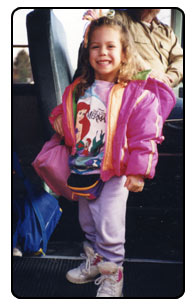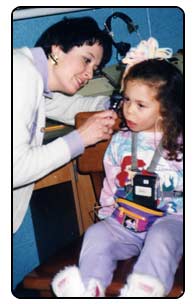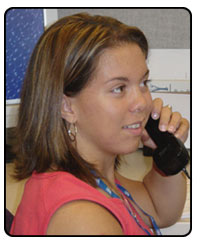Hearing Impairment: Kristin's Story
When I was 18 months old, I was diagnosed with moderate-to-severe bilateral, sensorineural hearing loss. In layman's terms, I am partially deaf in both ears. I've lived for 17 years as a person with hearing aids in a mainstream world. However, it has been a long journey to get to where I am today.
School, Friendships, and Feeling Self-Conscious
When I was 2½, I went off to my first day of preschool on a little yellow school bus. Most kids my age were happily watching Sesame Street at home. But because I had a hearing impairment, my parents felt that early intervention was the smartest option. So I went to a school for the deaf for the first few years of my childhood.
I did so well that the teachers decided to give me a new challenge: several classes a day in a regular public elementary school. I thrived there as well, and my parents and teachers felt that I was ready to mainstream (attend a regular school at my own grade level).
My parents decided a private school might be best for me and they spent a lot of time interviewing different schools, looking for things that most parents wouldn't think twice about. For example, it was important that a school had carpeting rather than a tile floor so that sounds wouldn't echo and confuse me.

I can still recall the day I met my new teacher. She had big glasses and a shiny white smile and welcomed me with open arms. She told me how excited she was for me to be in her class. At 4½, I started kindergarten.
I didn't really know I had a disability until I was at my new school and I saw all these kids without hearing aids and FM sets. It was the first time I felt ashamed of my hearing impairment because I wasn't like everyone else.
Whenever a classmate asked me about "the thing in my ear," I would get upset and run away. My mother realized that I was having difficulty explaining this to the other kids and decided to do something about it. She arranged to have a speaker come to my class and talk to the kids about hearing impairment. I know that this helped kids understand because I eventually started making friends. I think that they were just scared to talk to me because they were clueless about what a hearing aid was. Maybe they thought I was an alien or something!
It turned out my FM set helped the other kids, too. The device, which I wore around my waist attached to two ear-mold cords, was linked to a wireless microphone my teachers wore. One of my teachers would forget to turn her microphone off when she left the classroom. Of course, we were rowdy when she left, but because I could still hear her, I was able to warn everyone when she was coming back. She'd find us all sitting in our chairs with our hands politely folded. That's probably why we were the only class that had an unusually high number of gold stars on the good behavior chart. Not only that, I could hear everything the teacher said in the faculty lounge on the other side of school! I don't think that I told her about that minor detail until the end of the school year.
Once I started middle school, I started feeling more and more self-conscious about having a hearing impairment. My FM set was no longer cool, and having speech-therapy sessions three times a week wasn't fun. Because I had cleft palate when I was born, it was extra work to develop my speech skills. I really felt that my classmates thought I was mentally impaired. I didn't like feeling different from them so I threw temper tantrums in front of my mom and dad until they finally let me wear only hearing aids and stop the speech-therapy sessions. I was so relieved that the speech therapy I'd been having my whole life was finally over.
Surgery, Surgery, and More Surgery

I've always been prone to ear infections and I got a really bad one in fourth grade. The infection was bad enough to require hospitalization, but my parents felt that going to the hospital would be detrimental to my schooling. So they had all the hospital supplies shipped to my house and my mom acted as my nurse.
Because I needed intravenous antibiotics to treat the infection, I had an IV needle put in my arm at the hospital. It was attached to a monitor that I wore around my waist. It was about the size of a fanny pack and I absolutely despised it. On top of feeling self-conscious in general, I now had to walk around with all this bulky equipment on my body. I was fortunate that my teachers and some of my classmates were sympathetic about my situation, otherwise I'd have had a really tough time emotionally.
I've had about 15 operations on my ears since I was born, most of which have been tube replacements to help drain my ears. It is kind of funny how close I am to some of the doctors and nurses in the surgical department at the hospital. It's similar to how people who play sports feel a bond with their coaches — in my case, it's the doctors and nurses who are giving me tips and rallying me on.
My most recent surgery was a tympanoplasty, which is a procedure to patch a hole in the tympanic membrane (eardrum). My doctor patched the eardrum by taking a skin graft of the inside portion of my ear. The moment I woke up from anesthesia I could hear my parents and the nurses without my hearing aid; it was a very joyous moment. I can imagine that the happiness expressed on my face after the surgery was a truly rewarding sight for my doctor.
Ironically, one of the side effects for me when I wake up from anesthesia is to cry. After the tympanoplasty, my new hearing ability made it one of the strangest cries I ever had. Later that day at the dinner table, my dad took a napkin and covered his lips (so that I wouldn't read them) and said something. I repeated it with confidence.
The surgery also allowed me to go into water (shower, bath, and a pool) for the first time ever without earplugs. Earplugs were a problem for me, too, because I didn't like people staring at me whenever I was at the pool.
Watch What You Say — I Can See It!

Although I could hear better without my hearing aid after the tympanoplasty, the increase in volume was just enough for me to hear louder voices, but not whispers or quieter tones. So I still rely on two other forms of communication: a hearing aid and lipreading.
My hearing aid allows me to distinguish sounds from one another more clearly. And I've become really good at reading people's lips! It's a technique that I adopted at a very early age and will use for the rest of my life, regardless of my hearing capabilities. My friends can't get over how I can pretty much watch people have conversations across the room and absorb what they're saying.
When I need to hear sounds other than conversations or be sure I hear every word that's said, I rely on my hearing aid. If I can't make a word out right away, I will go over the words that sound similar until something fits the context of the conversation. I do this first before I ask the person to repeat what they say. Otherwise it'd be really frustrating to have a conversation with me. People often ask why I don't use two hearing aids and I honestly believe that my one hearing aid has enough power to compensate for the ear without the hearing aid.
With new technology constantly evolving, I had an opportunity 3 years ago to replace my analog hearing aid with a digital one. It was tricky learning to adjust to the new hearing aid because of the way my old hearing aid magnified every sound. The digital hearing aid is quieter and required a whole month for me to get used to, but I absolutely love it.
With my digital hearing aid, I have better quality sounds processing through my brain. Once I was at a rock concert and my mom told me something in a loud voice and I replied back in my normal voice. I forgot that others can't hear the way I can! Of course my mom asked me to speak up about three times until she could hear me decently.
The Future
I'm going to attend James Madison University in the fall, which is an exciting thing for me. I'll have a chance to be in an environment where I don't know everyone. This also means that I will have to explain my deafness to everyone that I meet, including my roommates.
When I know I'll be in a new environment, I like to wear my hair down so that it covers my hearing aid. This way I know that people will treat me like any other person and not judge me before they talk to me. Don't get me wrong, I have much more confidence than when I was in middle school. I don't have any problems talking about my hearing impairment, and in fact, I would much rather have people ask me questions than talk about it behind my back.
I've already started to prepare for college by getting an alarm clock that vibrates under my pillow. This way I'll be respectful of my roommates, but I still worry about what I'll do in some situations, like when a roommate forgets her room key. Will I hear her knock? It's all a matter of adjusting independently to a new way of life.
I often wonder about the things that the future will bring and if there will be a time in my lifetime where I will be able to hear normally. In the meantime, I live every day to its fullest and take nothing for granted.
Reviewed by: Robert C. O'Reilly, MD
Date reviewed: March 2012
Note: All information is for educational purposes only. For specific medical advice, diagnoses, and treatment, consult your doctor.
© 1995-2024 KidsHealth ® All rights reserved. Images provided by iStock, Getty Images, Corbis, Veer, Science Photo Library, Science Source Images, Shutterstock, and Clipart.com


